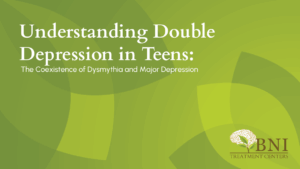Your Depressed Teenager Won’t Get Out of Bed. Now What?
It is hard for a parent to admit that something is not right with their child. Sure, when the teen years hit it is very common to notice an increase in moodiness and drama. But when the teenager flat out refuses to leave their bed, it is cause for worry, indeed.
Teens may go through a tough time, maybe due to social problems, family issues, or trouble at school. In most cases, these kinds of problems are usually short-lived and the teen will cycle through the emotions in time. Sometimes, though, depression can be at the root of the teen’s desire to stay isolated in their room.
Parents who suspect their teen is struggling with depression should enlist the help of a trained mental health expert. Teen depression should not be ignored, as suicides in this age cohort are on the rise.
About Teen Depression
When your teen won’t leave their room, or even get out of bed, and this persists, it might be due to depression. The NIH reports that teen depression now affects 20.1% of our youth between the ages of 12-17. This reflects about 5 million teens. Rates of depression are over twice as high in teen girls versus boys. Symptoms of teen depression may include:
- Feeling sad or hopeless.
- Changes in sleep patterns.
- Changes in eating habits; sudden weight gain or loss.
- Fatigued, listless.
- Loss of interest in usual hobbies.
- Irritable; angry outbursts
- Withdraws from friends and family.
- Low self-esteem.
- Sensitive to peer rejection or being criticized.
- Trouble paying attention in school.
- Frequent headaches or stomach aches.
- Talks about death, suicidal thoughts.
Teens that are still showing these signs after a two-week period should be seen by a doctor.
Causes of Teen Depression
Teen depression is somewhat of a mystery. With all the advances made in science and so much research, the exact cause of depression is still not known. Hormone changes during the teen years may contribute somewhat, and there are other risk factors for depression as well.
Some of these risk factors include:
- Family History. Depression is more common among teens with family members who also suffer from it.
- Teen Hormones. The influx of growth and sex hormones during the teen years can impact brain chemistry.
- Family Changes. Teens may have a tough time working through a difficult life event. It might involve moving to another town or school, a divorce, or a death in the family.
- Social Anxiety. The teen years are stressful. Social anxiety can be a problem for some teens. The social skills may not yet be developed, so the teen may struggle with fitting in or with feeling rejected.
- Social Media. Prolonged exposure to social media can lead to depression. Teens are very self-conscious of their looks and social media can make them more insecure. Body dysmorphia, being bullied, and eating disorders are common.
- School Pressures. Young people feel a lot of pressure to excel in high school as they look toward college. Some teens struggle with grades or a learning deficit and may come to feel they are letting their parents down.
- Childhood Trauma. A history of abuse or neglect can trigger depression even years later.
- Romantic Breakups. During the heightened emotions of the teen years, romantic feelings are intense. When a breakup or rejection occurs it can be very hard for the teen to deal with.
- COVID-19. The lingering effects of the COVID-19 pandemic have had a deep impact on teens. Long months of social isolation and loneliness, as well as the many changes COVID-19 brought, have been hard on teens.
Suicide Risk for Depressed Teens
Teen suicide has spiked in recent years. Suicide is now the second leading cause of death for young people between ages 10-24, according to data from the CDC. In teens, the danger is the still immature limbic system in the brain. This is the region that controls decision-making and impulsivity.
A teen may decide on a whim to just “end it all” because they do not have the coping skills. Where an adult can better manage difficult emotions, a teen isn’t equipped because their brain is still developing.
Warning signs of suicide among teens include:
- Impulsive behaviors.
- Becoming more withdrawn.
- Giving away prized possessions.
- Having angry outbursts, rage, or violent behaviors.
- Feeling like they have no real purpose in life.
- Obsessed with thoughts of death and suicide.
- Chronic sleep problems.
- Changes in eating and sleeping habits.
- Feelings of shame, guilt, excessive worry, or grief.
- Stops showing up for activities once enjoyed.
- Substance abuse.
- Obtaining the means to complete suicide, such as weapon or pills.
Getting Help for a Teen with Depression
So what does a parent do if their depressed teenager won’t get out of bed? The first big step is to not ignore the teen’s behavior and mood state. A day or two, fine, but a week or longer is a warning sign not to be ignored.
Set up a meeting with the family doctor as a starting point. Once a health issue is ruled out, the doctor can refer the teen to a mental health provider. In most cases, the teen will be treated with outpatient actions at first. This is likely to involve an antidepressant and talk therapy.
If the teen’s mood state worsens, though, it is time to consider a more intensive treatment solution. A residential program offers the teen a place to work through the issues that are factors in the depression. These programs also offer tutoring so the teen can keep up with school while in treatment for depression.
The mental health program includes:
- Therapy. This is offered in both one on one and group formats. Includes evidence-based therapies like CBT, mindfulness-based cognitive therapy, and solutions-focused therapy.
- Life skills. The teens will be taught new coping skills, communication skills, conflict resolution techniques, and relating skills.
- Meds. Some teens may benefit from drug therapy, although the risks must be weighed.
- Holistic. Some activities enhance results, such as surf therapy, equine therapy, recreational therapy, art, dance, music, and drama therapy, and yoga.
If your depressed teenager won’t get out of bed, and they aren’t getting better, consider a residential program for teens.
BNI Treatment Provides Residential Mental Health Treatment for Teens
BNI Treatment Centers give parents the needed support for helping a teen with depression with a mental health treatment center for teens. The expert psychiatric staff has designed a program that is attuned to the needs of teens, protocols that teens will respond to. For any questions about the program, please contact BNI today at (888) 522-1504.




